President Marcos has approved a P2.2-billion budget for the purchase of 1,000 ambulances intended to be distributed nationwide this year.

"The Office of the President has also approved a budget of P2 billion this year for the acquisition of 1,000 more PTVs (patient transport vehicles) to cover all cities and municipalities in the country," Marcos announced during the turnover of 51 ambulances to local government units (LGUs) and state-run hospitals in Western Visayas region on Thursday, Sept. 19.
“It (purchase of ambulances) is part of the bigger picture where we are upscaling the preparedness and response to calamities and disasters at both the local and at the national level,” he added.
The President vowed to provide every town in the country their own ambulance and medical responders.
“We hope, one day, that every town and city --- let me change that. We do not hope one day. We promise, one day, every town and city will be equipped with fully operational PTVs and medical responders on standby,” he said during the turnover ceremonies held in Passi City, Iloilo.
Marcos assured the people that the government will continue investing in healthcare, not only in the form of medical facilities and assets, but also in the capacity-building of medical professionals.
Meanwhile, the 51 PTVs were handed over to LGUs and hospitals through the Medical Transport Vehicle Donation Program (MTVDP) of the Philippine Charity Sweepstakes Office (PCSO).
The vehicles, which cost P2.1 million per unit, are equipped with a stretcher, oxygen tank, and blood pressure monitor, among other medical equipment.
From June 30, 2022 to Sept. 11 this year, 416 PTVs have been distributed to LGU beneficiaries from all regions except the National Capital Region (NCR).
The MTVDP, launched in 2019, aims to improve healthcare delivery in underserved areas by donating medical transport vehicles to LGUs at the provincial, city, and municipal levels, with priority given to vulnerable communities and geographically isolated and disadvantaged areas.
The program also covers government hospitals to ensure the timely and safe transportation of patients to and from medical facilities.